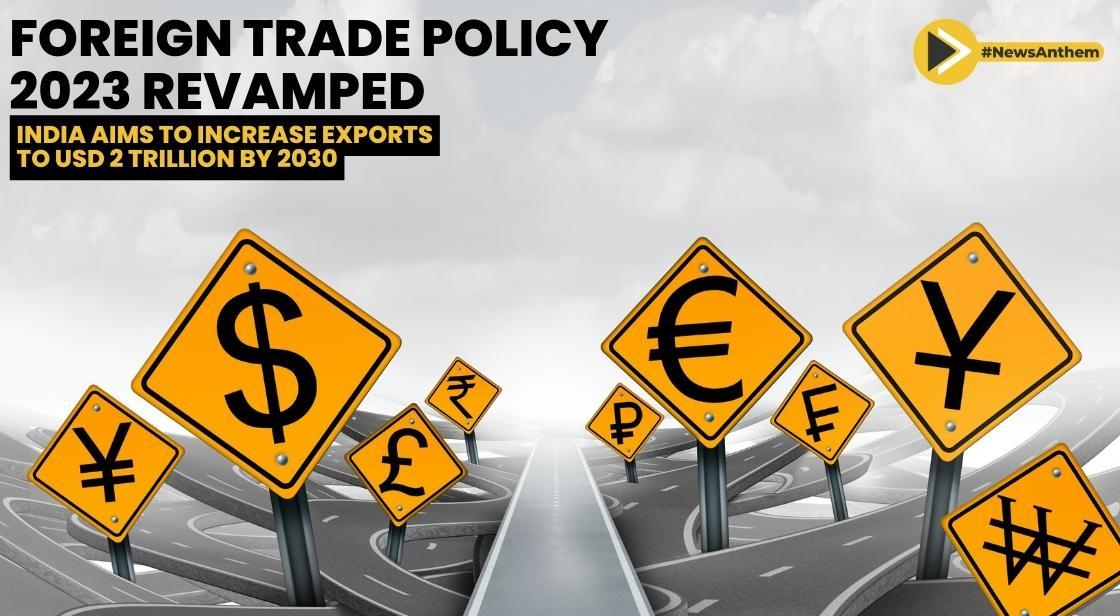The New Foreign Trade Policy 2023-India Aims to Increase Exports to USD 2 Trillion by 2030

News Synopsis
The Foreign Trade Policy 2023 is a dynamic and open-ended policy that seeks to take India's exports to new heights by accommodating the emerging needs of the time. Read on to know more about the policy and its key features.
The Union Minister of Commerce and Industry Piyush Goyal, recently launched the Foreign Trade Policy (FTP) 2023, which is an open-ended and dynamic policy accommodating the emerging needs of the time. The policy has been formulated after multiple stakeholder consultations and aims to increase India's overall exports, including services and merchandise exports, to $2 trillion by 2030.
Prime Minister Narendra Modi encouraged exporters to increase exports and become more deeply involved in the global value chain during his interaction with them on August 6, 2021.
Goyal lauded the Prime Minister's vision and guidance, which he believed has the potential to increase India's growth manifold, given the country's sizeable economy and manufacturing and service sector base.
This Vision is at the Core of the FTP 2023.
India's overall exports, including services and merchandise exports, have already crossed $750 billion and are expected to cross $760 billion this year, despite the challenging times globally.
Goyal stressed that every opportunity for export must be captured and utilised effectively.
In the next five months, during India's G20 presidency, there should be a massive concentrated outreach with the world both sector-wise and country-wise.
Incentives to Remission, Export Promotion through Collaboration, Ease of Doing Business, and Emerging Areas are the four pillars of the FTP 2023. The policy document is based on the continuity of time-tested schemes facilitating exports as well as a document that is nimble and responsive to the requirements of the trade. It is based on principles of 'trust' and 'partnership' with exporters.
Four Pillars of the FTP 2023:
The FTP 2023 aims to take India's exports to $2 trillion by 2030, and it is based on four pillars.
Incentive to Remission:
Incentive to Remission is the first pillar of the FTP 2023, which includes an Amnesty Scheme for exporters to close old pending authorisations and start afresh.
The scheme is intended to provide relief to exporters who have been unable to meet their obligations under Export Promotion of Capital Goods and Advance Authorisations, and who are burdened by high duty and interest costs associated with pending cases.
All pending cases of default in meeting Export Obligation (EO) of authorisations can be regularised on payment of all customs duties that were exempted in proportion to unfulfilled Export Obligation. The interest payable is capped at 100% of these exempted duties under this scheme.
However, no interest is payable on the portion of Additional Customs Duty and Special Additional Customs Duty, which is likely to provide relief to exporters as the interest burden will come down substantially.
Export Promotion through Collaboration:
Export Promotion through Collaboration is the second pillar of the FTP 2023, which focuses on building partnerships with State governments and taking forward the Districts as Export Hubs (DEH) initiative to promote exports at the district level and accelerate the development of grassroots trade ecosystems.
Efforts to identify export-worthy products and services and resolve concerns at the district level will be made through an institutional mechanism–State Export Promotion Committee and District Export Promotion Committee at the State and District level, respectively.
District-specific export action plans will be prepared for each district outlining the district specific strategy to promote the export of identified products and services. The plans will be prepared by the District Export Promotion Committee (DEPC) and the State Export Promotion Committee (SEPC) at the district and state levels, respectively.
The committees will identify export-worthy products and services in each district and will address concerns specific to that district.
The Aims to Streamline the SCOMET Special Chemicals, Organisms, Materials, Equipment, and Technologies Policy:
India is placing more emphasis on the "export control" regime as its integration with export control regime countries strengthens.
The policy regime is being made more robust to implement international treaties and agreements entered into by India.
A robust export control system in India would provide access to dual-use high-end goods and technologies to Indian exporters while facilitating exports of controlled items/technologies under SCOMET from India.
In addition, the FTP 2023 is focused on facilitating e-commerce exports, which are a promising category that requires distinct policy interventions from traditional offline trade.
Various estimates suggest e-commerce export potential in the range of $200 to $300 billion by 2030.
The FTP outlines the intent and roadmap for establishing e-commerce hubs and related elements such as payment reconciliation, book-keeping, returns policy, and export entitlements.
As a starting point, the consignment-wise cap on e-commerce exports through courier has been raised from ₹5Lakh to ₹10 Lakh in the FTP 2023.
Depending on the feedback of exporters, this cap will be further revised or eventually removed.
Exim Ecosystem and E-Commerce Policy:
The comprehensive e-commerce policy addressing the export/import ecosystem would be elaborated soon, based on the recommendations of the working committee on e-commerce exports and inter-ministerial deliberations.
Extensive outreach and training activities will be taken up to build capacity of artisans, weavers, garment manufacturers, gems and jewellery designers to onboard them on e-commerce platforms and facilitate higher exports.
The FTP 2023 also introduces provisions for merchanting trade to develop India into a merchanting trade hub.
Merchanting trade of restricted and prohibited items under export policy would now be possible.
Merchanting trade involves shipment of goods from one foreign country to another foreign country without touching Indian ports, involving an Indian intermediary.
This will be subject to compliance with RBI guidelines and won’t be applicable for goods/items classified in the CITES and SCOMET list.
In course of time, this will allow Indian entrepreneurs to convert certain places like GIFT city into major merchanting hubs as seen in places like Dubai, Singapore, and Hong Kong.
"Vivaad se Vishwaas" Initiative:
Finally, the government is strongly committed to reducing litigation and fostering trust-based relationships to help alleviate the issues faced by exporters.
In line with the "Vivaad se Vishwaas" initiative, which sought to settle tax disputes amicably, the government is introducing a special one-time Amnesty Scheme under the FTP 2023 to address default on Export Obligations.
This scheme is intended to provide relief to exporters who have been unable to meet their obligations under EPCG and Advance Authorizations, and who are burdened by high duty and interest costs associated with pending cases.
All pending cases of the default in meeting Export Obligation (EO) of authorizations mentioned can be regularized on payment of all customs duties that were exempted in proportion to unfulfilled Export Obligation. The interest payable is capped at 100% of these exempted duties under this scheme.
However, no interest is payable on the portion of Additional Customs Duty and Special Additional Customs Duty, and this is likely to provide relief to exporters as interest burden will come down substantially.
It is hoped that this amnesty will give these exporters a fresh start and an opportunity to come into compliance.
ThinkWithNiche News Last Take on Foreign Trade Policy 2023 Launched: A Comprehensive Policy to Boost India's Exports
The FTP 2023 is a dynamic and open-ended policy that seeks to take India's exports to new heights by accommodating the emerging needs of the time.
With the aim of increasing exports manifold and taking it to 2 trillion dollars by 2030, the policy is based on four pillars-Incentive to Remission, Export promotion through collaboration, Ease of doing business, and Emerging Areas.
The policy is based on the principles of 'trust' and 'partnership' with exporters and will be continuously streamlined with the help of feedback from the trade and industry.
The new policy will introduce a one-time Amnesty Scheme for exporters to close the old pending authorizations and start afresh. It will also encourage recognition of new towns through "Towns of Export Excellence Scheme" and exporters through "Status Holder Scheme."
The policy is expected to facilitate exports by streamlining the popular Advance Authorization and EPCG schemes and enabling merchanting trade from India.
The policy also focuses on promoting exports from the districts by building partnerships with State governments and taking forward the Districts as Export Hubs (DEH) initiative.
The policy aims to identify export-worthy products and services and resolve concerns at the district level through an institutional mechanism - State Export Promotion Committee and District Export Promotion Committee at the State and District level, respectively.
FTP 2023: Synopsis
Overall, the FTP 2023 is a comprehensive policy that emphasizes process re-engineering and automation to facilitate ease of doing business for exporters.
With the incorporation of feedback from trade and industry, the policy is expected to streamline processes and update FTP from time to time.
The policy is a step towards realizing the vision of the Prime Minister to increase India's exports manifold and make the country a major player in the global market.
You May Like









